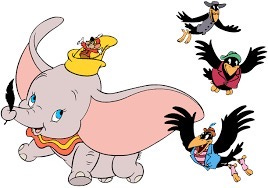Dumbo Unchained
Let the Crows Sing
Dumbo Unchained: Let the Crows Sing Again!
By Jim Reynolds
Apparently, Dumbo is unfit to fly--but WAP soars, F*** tha Police marches on, and Eminem gets a standing ovation for narrating graphic violence in perfect meter.
Somewhere between the flying elephant and the stripper pole, we lost the plot.
In 1941, Disney gave us something rare: a little elephant born different, mocked relentlessly, shunned by his own kind, and separated from his loving mother--who, let's not forget, was chained up for the crime of protecting her child. Dumbo was alone. Cast out. Ridiculed by clowns (is there any more accurate stereotype?), policed by gossipy old matron elephants, and paraded as a freak.
All he had left was Timothy--the smallest, smartest friend in the circus--and a single feather.
And then came the crows--a raucous, boisterous flock of scene-stealing philosophers in feathers. They cracked wise, riffed in harmony, and laughed at the absurdity of a flying elephant--until they didn't. Until they did something no one else in the film had the heart or courage to do: they stepped up to help a new friend. They saw past the joke, past the ears, past the circus. They saw the kid. And together, they gave him the most important push of his young life--off a cliff, into the air, and toward everything he was meant to be.
And as they did, they sang one of the cleverest, most joyous songs in animation history:
When I See an Elephant Fly
Words by Ned Washington
Music by Oliver Wallace
© Walt Disney Music Company
[spoken by various birds]
Did you ever see an elephant fly
Well I seen a horse fly
I seen a dragon fly
I seen a house fly
I seen all that too
[sung - verse one]
I seen a peanut stand
And heard a rubber band
I seen a needle that winked its eye
But I've been, done, seen about everything
When I see a elephant fly What'd you say boy?
I said when I see a elephant fly
[verse two]
I seen a front porch swing
Heard a diamond ring
I seen a polka dot railroad tie
But I've been, done, seen about everything When I see a elephant fly
[bridge]
I saw a clothes horse and he rear up and buck
And they tell me that a man made a vegetable truck
I didn't see that, I only heard
Just to be sociable I'll take your word
[verse three and out the door]
I heard a fireside chat
I saw a baseball bat
And I just laughed 'till I thought I'd die
But I've been, done, seen about everything
When I see a elephant fly
[turnaround]
But I've been, done, seen about everything
When I see a elephant fly
[all together, with much joyous playfulness]
When I see a elephant fly
That scene--alive with harmony, humor, rhythm, and heart--was the highlight of my boyhood. It stayed with me. Not because of some twisted stereotype, but because it was kind. It was creative. It was human. The crows were the only ones who saw potential in the little guy--and they made me believe in mine.
Now it's banned--or shelved with a warning label, far from the sticky hands and wide eyes it was made for. Apparently, courage and whimsy now require parental guidance.
The same people who pump Cardi B's WAP into award shows and classrooms have decided Dumbo is dangerous.
The same culture that venerates F*** tha Police as "expression" has labeled When I See an Elephant Fly a "microaggression."
Eminem's early work--graphic, violent, vulgar--is celebrated as raw genius. Tyler the Creator was a walking felony fantasy.
But Dumbo? That's the threat?
Let me tell you what's actually threatening: the coordinated erasure of joy, whimsy, and moral clarity under the guise of progressive morality.
The crows were voiced by the Hall Johnson Choir--legendary black performers. The harmonies were real. The talent was real. The emotion was real.
The lead singer was white, yes--but it was appreciation, not appropriation. And it worked. It swung. It soared.
It was culture at its best: collaborative, musical, uplifting.
And now it's gone.
Why? Because it didn't pass the modern DEI sniff test, brought to you by people who never laughed at a clever line, never teared up at a flying elephant, and wouldn't know real art if it danced on their iPad.
But here's the kicker: the feather wasn't magic. That was the whole point.
Dumbo could fly all along. The feather just gave him the courage to try.
And maybe that's what they're afraid of--because a whole generation might rediscover that the power is already inside them, and they don't need a permission slip from the culture police.
Let the crows sing again.
Let Dumbo fly.
And tell the gatekeepers of grievance:
We kept the feather.
We still believe.
And we're pushing back--off the cliff, into the sky.



